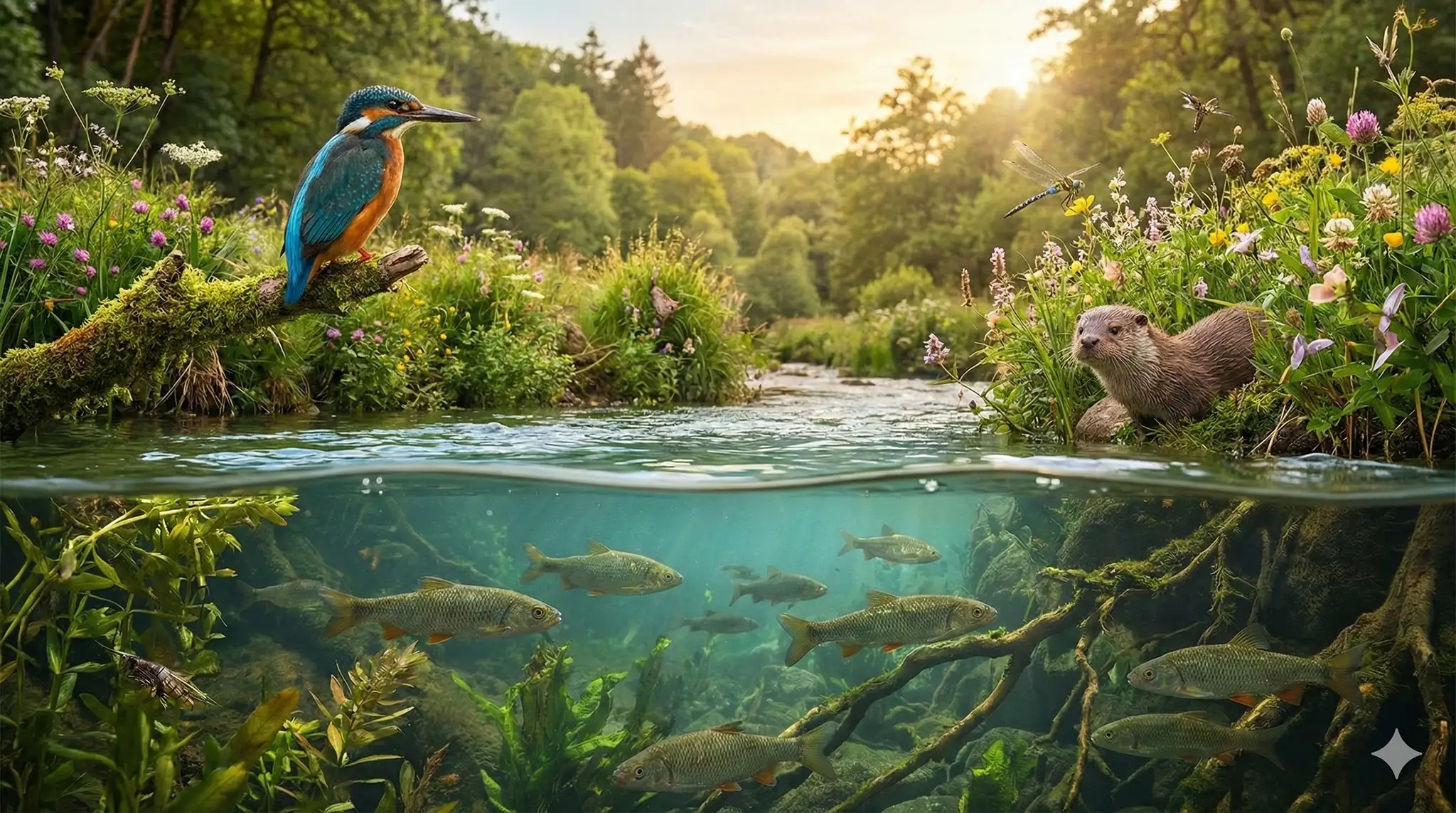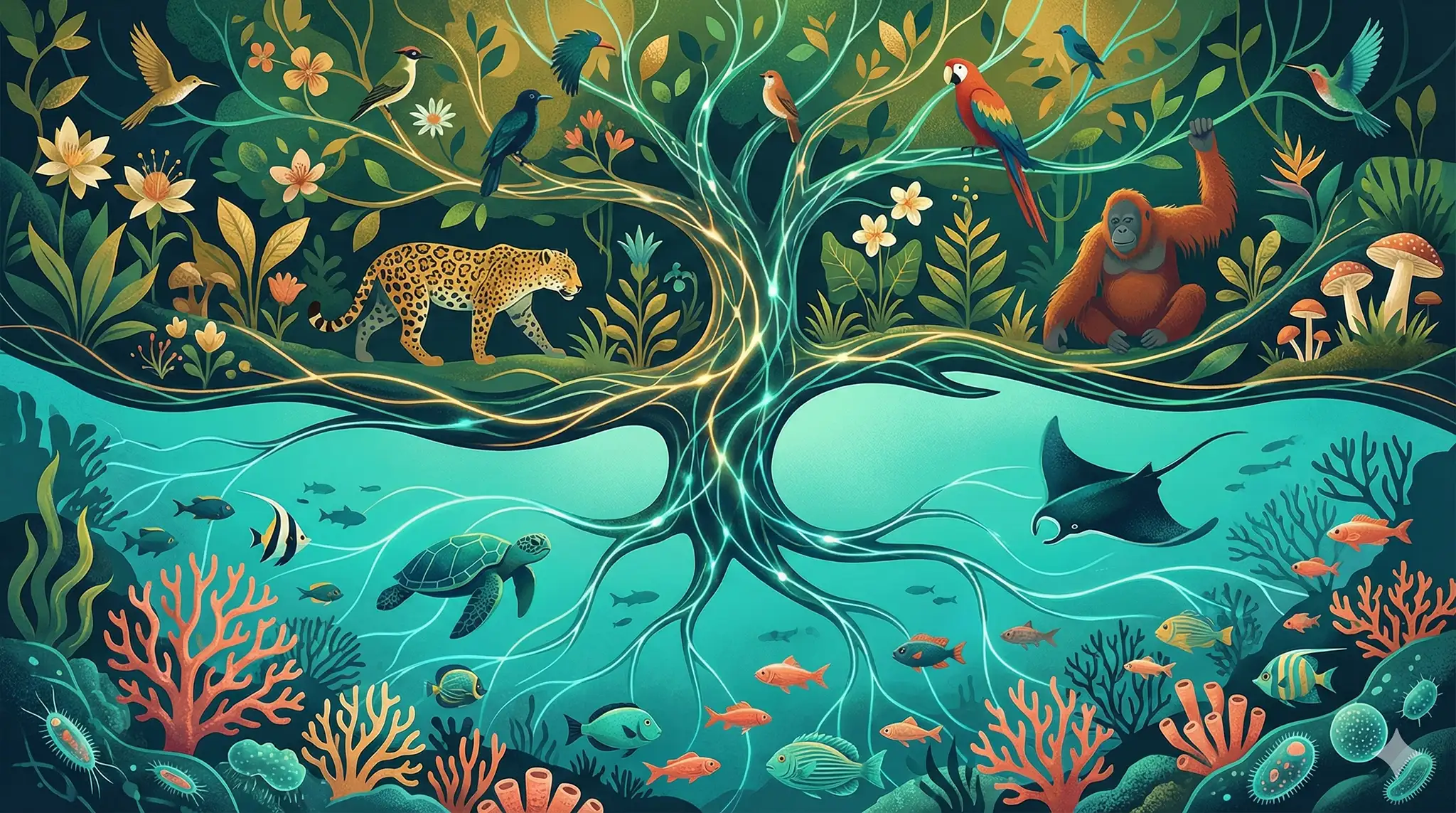Biodiversity
The Essential Benefits of Biodiversity: Why Nature Matters for the UK Economy, Health and Future
By Clwyd Probert | Originally published: 18 January 2023 | Updated: 15 December 2025
Biodiversity—the wide variety of life on Earth—provides the UK with ecosystem services valued at £1.8 trillion, supplies approximately 40% of pharmaceutical products, and underpins the food security of every household in Britain. From the bees pollinating crops worth £1 billion annually to the peatlands storing 3.2 billion tonnes of carbon, nature's contributions to our economy, health, and wellbeing are both vast and irreplaceable. Understanding these benefits reveals why protecting biodiversity is not simply an environmental cause but an essential investment in our collective future.
Economic Value: Nature as Britain's Hidden Infrastructure
The economic case for biodiversity protection has never been more compelling. The landmark Dasgupta Review, commissioned by HM Treasury, fundamentally changed how economists view nature's contribution to prosperity by establishing that natural capital should be valued alongside financial and produced capital.
 Globally, ecosystem services are valued at $125–145 trillion per year—approximately 1.5 to 2 times greater than global GDP. The World Economic Forum calculates that over half of global GDP ($44 trillion) depends moderately or highly on nature, with biodiversity loss potentially causing a $2.7 trillion annual GDP decline by 2030.
Globally, ecosystem services are valued at $125–145 trillion per year—approximately 1.5 to 2 times greater than global GDP. The World Economic Forum calculates that over half of global GDP ($44 trillion) depends moderately or highly on nature, with biodiversity loss potentially causing a $2.7 trillion annual GDP decline by 2030.
UK Natural Capital at a Glance (ONS 2024)
- £1.8 trillion — Total asset value of UK ecosystem services
- £87 billion — Annual value of ecosystem services to the UK economy
- £489 billion — Asset value of health benefits from recreation in nature
- £2.77 billion — Annual value of air pollution removal by vegetation
Pollination services demonstrate nature's direct economic contribution with remarkable clarity. In the UK, pollinators contribute approximately £1 billion annually to farming, with wild insect pollinators alone providing over £600 million per year. Artificially replacing insect pollination would cost an unviable £1.9 billion—a stark illustration of how we depend on services that nature provides freely.
Natural flood management delivers exceptional returns on investment. Research by the Wildlife Trusts (2024) demonstrates an average 4:1 cost-benefit ratio over 10 years, rising to an impressive 10:1 return over 30 years. With flooding costing the UK approximately £2.2 billion annually—projected to rise significantly by the 2050s—the government has committed over £300 million to natural flood management solutions.
Biodiversity Net Gain, mandatory since February 2024, requires most developments in England to deliver a minimum 10% biodiversity gain maintained for 30 years. This policy shift recognises that healthy ecosystems are essential infrastructure, not optional extras.
Human Health Depends on Thriving Ecosystems
The pharmaceutical industry's debt to biodiversity remains substantial. According to the World Health Organization, approximately 40% of pharmaceutical products draw from nature and traditional knowledge, including landmark treatments such as aspirin, artemisinin for malaria, and childhood cancer drugs vincristine and vinblastine derived from the Madagascar periwinkle. Around 70% of cancer drugs are natural or bio-inspired products.
Mental health benefits from biodiversity exposure are increasingly well-documented. A landmark University of Exeter study found that people spending at least 120 minutes per week in nature were 59% more likely to report good health and 23% more likely to report high wellbeing. Research from King's College London (2024) discovered that environments with diverse natural features provide greater mental wellbeing benefits—with nearly a quarter of the positive impact attributable to biodiversity itself.
"Greater biodiversity reduces disease transmission risk by making it harder for single pathogens to spread rapidly—a principle known as the 'dilution effect' that has profound implications for pandemic prevention."
UK green social prescribing represents a policy frontier where biodiversity and healthcare intersect. NHS England's cross-government programme referred over 8,500 people to green activities, achieving an 85% uptake rate. The programme delivered a social return on investment of up to £2.42 for every £1 invested. Scaling Wildlife Trusts programmes to expected participation levels could save the NHS an estimated £635.6 million annually.
The connection between green space and longevity is equally striking. Men in neighbourhoods with highest access to green space live 3 years longer on average than those in areas with lowest access—a pattern replicated across demographic groups.
Food Security Rests on Biological Foundations
The world's food supply depends critically on biodiversity, yet this foundation is eroding at an alarming rate. More than 75% of global food crops rely at least partially on animal pollination, while the volume of pollinator-dependent agricultural production has increased 300% over the past 50 years—even as 16% of vertebrate pollinators and over 40% of invertebrate pollinator species face extinction.
Genetic diversity loss threatens crop resilience in ways that could prove catastrophic. The FAO estimates that 75% of crop genetic diversity was lost between 1900 and 2000, with over 90% of crop varieties disappearing from farmers' fields. Today, 75% of the world's food comes from only 12 plant species and 5 animal species, with just three crops—rice, maize, and wheat—providing nearly 60% of global calories.
Soil biodiversity underpins agriculture yet receives insufficient attention. Approximately 95% of food production depends on soil, yet 40% of UK agricultural soils are degraded due to intensive practices. Soil degradation costs England and Wales £1.2 billion per year, with soil being destroyed 10 times faster than it is created.
The State of Nature 2023 report found that the distribution of pollinator species in the UK has decreased by 18% on average, while species providing natural pest control (such as the 2-spot ladybird) declined by 34%. These are not abstract statistics—they represent the erosion of the natural systems upon which British agriculture depends.
Carbon Storage: Britain's Natural Climate Infrastructure
The UK's carbon storage capacity is vast but increasingly compromised. Understanding these natural carbon stores—and their degradation—is essential for meaningful climate action.
UK peatlands represent the nation's largest terrestrial carbon store, holding approximately 3.2 billion tonnes of carbon—equivalent to all the carbon stored in UK woodlands combined. However, 80% of UK peatlands are currently degraded, causing them to emit rather than absorb carbon. Degraded UK peatlands release approximately 16–23 million tonnes of CO₂ equivalent annually. Peatland restoration would cost £8–22 billion over 100 years but would save £109 billion in reduced carbon emissions.
| Habitat | Carbon Stored | UK Coverage |
|---|---|---|
| Peatlands | 3.2 billion tonnes | 80% degraded |
| Woodlands | 1 billion tonnes | 13% of UK land |
| Seabed habitats | 244 million tonnes | Significant loss |
| Grasslands | 2 billion tonnes | Variable condition |
Blue carbon from coastal ecosystems represents an underappreciated asset. UK seabed sediments and vegetated habitats store 244 million tonnes of organic carbon in just the top 10cm. Seagrass captures carbon up to 35 times faster than tropical rainforest, yet 90% of UK seagrass has been lost in the last century. Saltmarshes contain 60% of organic carbon in coastal vegetated habitats—yet 85% of UK saltmarsh has been lost since the mid-19th century.
Nature-based solutions could contribute up to 30% of climate mitigation needed by 2050 to meet Paris Agreement goals. The IPCC ranks these solutions among the top 5 most effective strategies for mitigating emissions by 2030, with every £1 invested in climate adaptation through nature yielding £4 in benefits.
State of UK Nature: The Scale of the Challenge
The State of Nature 2023 report, produced by over 60 conservation organisations, provides the most comprehensive assessment of UK biodiversity. The findings reveal both the severity of decline and the urgency of action required.
UK species abundance has fallen by 19% on average since 1970, with less than half of UK biodiversity remaining due to cumulative human impacts. Of the 10,000+ species assessed in Great Britain, 16% (one in six) are at risk of extinction—approximately 1,500 species in England, Scotland, and Wales.
UK Wildlife Decline by Group
- Birds: 43% threatened; farmland birds down 62% since 1970
- Flowering plants: 54% have decreased in distribution
- Bryophytes: 59% decrease in mosses and liverworts
- Amphibians and reptiles: 31% threatened
- Invertebrates: Found in 13% fewer places since 1970
Yet conservation successes demonstrate that recovery is possible when we commit to action. The red kite, once one of only three globally threatened UK species with a tiny Welsh population, now numbers over 10,000 birds following successful reintroduction—approximately 10% of the world population. Beavers, extinct in Britain for 400 years, have been reintroduced across Scotland and England, now numbering over 400 individuals.
The UK Government has committed to halting species decline by 2030 and reversing decline by 2042, alongside restoring or creating 500,000+ hectares of wildlife-rich habitat. Under the 30x30 commitment, the UK has pledged to protect 30% of land and sea by 2030—though as of December 2023, only 8.5% of England mapped as contributing to this target.
Water and Air Purification by Natural Systems
Biodiversity provides essential purification services that would be prohibitively expensive to replace with engineered solutions.
Wetland water filtration offers remarkable value. Economic analysis by WWT and Eftec calculated that creating 25,000 hectares of wetlands designed to improve water quality would generate £955 million net value over 60 years. This matters because only 14% of England's rivers are currently in good ecological health, with every river in England now polluted beyond legal chemical standards.
Air pollution removal by vegetation delivers quantifiable health benefits. Nature removed almost 1.4 million tonnes of pollutants from UK air in 2022. The ONS Natural Capital Accounts for England value air pollution removal by vegetation at £2.17 billion annually, with PM2.5 removal specifically worth £1.86 billion. Urban green spaces also reduce temperatures by over 0.5°C, mitigating the urban heat island effect.
The value of living near green space is estimated at over £130 billion across the UK—a figure that captures just part of the benefits healthy ecosystems provide to human communities.
Social and Cultural Benefits Strengthen Communities
Beyond instrumental value, biodiversity enriches human life through recreation, cultural connection, and psychological wellbeing.
Nature-based tourism contributes substantially to the UK economy. According to ONS Tourism and Outdoor Leisure Accounts, nature contributed £12 billion to tourism and outdoor leisure within the UK in 2019, with an asset value of £480 billion. Walking, running, and cycling generated £3.6 billion at their 2018 peak, while wildlife watching and park visits contributed £1.6 billion.
Wellbeing benefits are both substantial and well-evidenced. Mental Health Foundation research found that 70% of UK adults agree being close to nature improves their mood, 49% say it helps them cope with stress, and 44% say it reduces anxiety. During the COVID-19 pandemic, 45% of people said visiting green spaces helped them cope.
Public engagement with nature remains strong. Natural England's People and Nature Survey recorded an estimated 3.9 billion visits to green and natural spaces in England, with 58% of the population making at least one outdoor leisure visit weekly. The RSPB's Big Garden Birdwatch 2024 attracted over 600,000 participants—demonstrating both public interest and the vital habitat that UK gardens provide.
Latest Global Assessments Confirm Urgency (2024–2025)
Major reports released in late 2024 and early 2025 underscore both the severity of biodiversity loss and the narrowing window for action.
The WWF Living Planet Report 2024 documented a 73% average decline in monitored wildlife populations from 1970–2020—up from 69% reported in 2022. Based on nearly 35,000 population trends across 5,495 species, the report found steepest declines in Latin America and the Caribbean (95%) and Africa (76%). Freshwater populations have collapsed by 85%.
UN CBD COP16 in Cali, Colombia (October–November 2024) achieved historic progress. The landmark Cali Fund established the first-ever global mechanism for sharing benefits from Digital Sequence Information on genetic resources. However, only 44 countries had updated full National Biodiversity Strategies and Action Plans—meaning 56% of CBD Parties still lacked strategies just six years from 2030 targets.
The IUCN Red List updates (2024–2025) expanded assessed species to 169,420, with 47,187 species threatened with extinction (28%). The Global Tree Assessment found 38% of the world's trees at risk of extinction—more than all threatened birds, mammals, reptiles, and amphibians combined.
Frequently Asked Questions About Biodiversity Benefits
What is the economic value of UK biodiversity?
UK ecosystem services are valued at £1.8 trillion according to the ONS Natural Capital Accounts 2024, representing 72% of GDP. Annual ecosystem service flows contribute £87 billion to the UK economy, with recreation and health benefits alone valued at £489 billion in asset terms.
How does biodiversity benefit human health?
Biodiversity provides approximately 40% of pharmaceutical products, including cancer treatments and antibiotics. Spending 120 minutes weekly in nature increases the likelihood of good health by 59%. Green social prescribing delivers £2.42 return per £1 invested, with potential NHS savings of £635.6 million annually.
Why is biodiversity important for food security?
Over 75% of global food crops depend on animal pollination. UK pollinators contribute £1 billion annually to farming. However, 75% of crop genetic diversity has been lost since 1900, and pollinator distribution in the UK has decreased by 18% on average, threatening long-term food production.
How much carbon do UK ecosystems store?
UK peatlands store 3.2 billion tonnes of carbon—equivalent to all UK woodlands combined. However, 80% of UK peatlands are degraded and emitting carbon. Woodlands store 1 billion tonnes, while seabed habitats contain 244 million tonnes. Grassland soils hold 2 billion tonnes to one metre depth.
What is the current state of UK biodiversity?
UK species abundance has declined 19% since 1970, with one in six species (16%) at risk of extinction. Farmland birds have fallen 62% since 1970, and only 14% of important wildlife habitats are in good condition. The UK Government has committed to halting decline by 2030.
What can individuals do to help protect biodiversity?
Support wildlife-friendly gardening, reduce pesticide use, and choose sustainable products. Engage with local conservation groups and citizen science projects like the Big Garden Birdwatch. Advocate for stronger environmental policies and support organisations working to protect and restore habitats.
Investment in Nature Is Investment in Our Future
The evidence assembled here demonstrates that biodiversity is not a luxury but fundamental infrastructure. The £1.8 trillion asset value of UK ecosystem services, £1 billion annual pollination contribution, and potential £2.1 billion NHS savings from improved green space access represent returns that dwarf conservation costs.
Yet the window for action is narrowing. With 73% of global wildlife lost since 1970, 16% of UK species at extinction risk, and 80% of UK peatlands degraded, the costs of inaction compound rapidly. The UK's 30x30 commitment, mandatory Biodiversity Net Gain, and network of Local Nature Recovery Strategies provide frameworks for reversal—but only with sustained commitment and investment.
The conservation successes—red kites recovering from near-extinction to 10,000 birds, beavers returning after 400 years, Hope Farm demonstrating 177% increases in breeding birds—prove that restoration works when properly resourced. For all of us in the UK in 2025, understanding these benefits is the first step toward the public support and policy action that our remaining biodiversity urgently requires.
Sources and Further Reading
- ONS Natural Capital Accounts 2024
https://www.ons.gov.uk/economy/environmentalaccounts/bulletins/uknaturalcapitalaccounts/2024 - State of Nature 2023 Report
https://stateofnature.org.uk/ - WWF Living Planet Report 2024
https://www.wwf.org.uk/our-reports/living-planet-report-2024 - World Economic Forum: Nature Risk Rising
https://www.weforum.org/publications/nature-risk-rising-why-the-crisis-engulfing-nature-matters-for-business-and-the-economy/ - NHS England: Green Social Prescribing
https://www.england.nhs.uk/personalisedcare/social-prescribing/green-social-prescribing/ - Wildlife Trusts: Natural Flood Management
https://www.wildlifetrusts.org/news/new-research-finds-wildlife-trust-natural-flood-management-schemes-deliver-ps10-benefits-every - FAO: Pollinators Vital to Our Food Supply
https://www.fao.org/newsroom/detail/Pollinators-vital-to-our-food-supply-under-threat/en - IUCN UK Peatland Programme
https://www.iucn-uk-peatlandprogramme.org/ - CBD COP16 Outcomes
https://www.cbd.int/article/agreement-reached-cop-16 - RSPB: State of Nature Report
https://www.rspb.org.uk/whats-happening/news/state-of-nature-report
Explore More About Biodiversity
Delve deeper into the world of wildlife conservation and discover how you can make a difference. Subscribe to our newsletter for the latest updates on biodiversity, climate action, and nature photography.
Browse Our Blog


